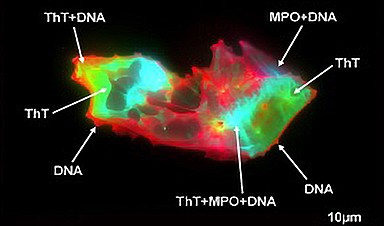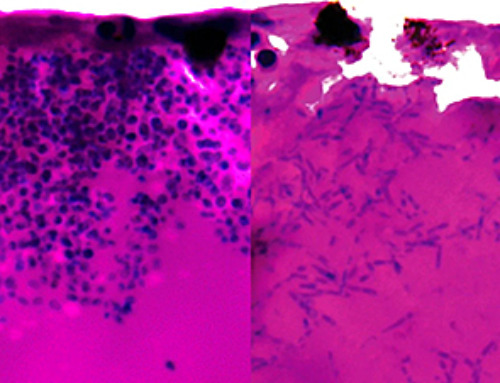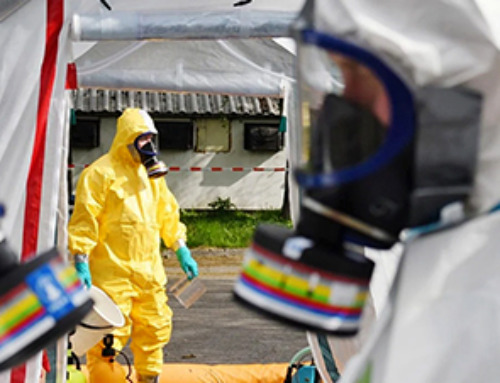By monitoring the body's molecular response to a viral attack, the new method developed by Flatiron Institute researchers and their colleagues can diagnose even asymptomatic patients with 98.4 percent accuracy.
By inspecting the body's immune response at a molecular level, a research team has developed a new way to test patients for COVID-19. Their method can potentially catch infections a matter of hours after exposure — far earlier than current COVID-19 tests can detect the virus — with near-perfect accuracy. The team describes their innovation, which is still in the early stages of development, in the February 27 issue of the journal Cell Reports Methods.
Most existing COVID-19 tests "rely on the same principle, which is that you have accumulated a detectable amount of viral material, for example, in your nose," says study lead author Frank Zhang, who worked on the project as a Flatiron research fellow at the Flatiron Institute's Center for Computational Biology (CCB) in New York City. "That poses a challenge when it's early in the infection time window and you haven't accumulated a lot of viral material, or you're asymptomatic."
An infographic explaining a new method for diagnosing patients with COVID-19. Credit: Lucy Reading-Ikkanda/Simons Foundation
When put to the test using real-world blood samples, the new method yielded an impressive 98.4 percent accuracy rating. That's especially impressive as the approach works just as well on asymptomatic patients, for whom rapid antigen tests can be less than 60 percent accurate. "It was really surprising that it worked so well," says Zhang, now an assistant professor at Cedars-Sinai Medical Center in Los Angeles. "It's a promising alternative and complementary approach to conventional PCR tests."
The new approach isn't ready for prime time yet, Zhang says. He and his colleagues only tested blood samples rather than the nasal samples that are more common and convenient for diagnosing COVID-19. Also, they need to make sure they can distinguish between the body's reaction to COVID-19 and its response to infections caused by other viruses, such as colds.
The researchers say they're optimistic, though, as other research groups have already made progress on tests that look solely at which genes turn on. Those same tests could easily add the mRNA analysis developed in the new study, thereby producing even better results, Zhang says. "Anything they can do, we can probably explore and join forces on," including catching cases within hours of initial exposure.
News
AI Helped Scientists Stop a Virus With One Tiny Change
Using AI, researchers identified one tiny molecular interaction that viruses need to infect cells. Disrupting it stopped the virus before infection could begin. Washington State University scientists have uncovered a method to interfere with a key [...]
Deadly Hospital Fungus May Finally Have a Weakness
A deadly, drug-resistant hospital fungus may finally have a weakness—and scientists think they’ve found it. Researchers have identified a genetic process that could open the door to new treatments for a dangerous fungal infection [...]
Fever-Proof Bird Flu Variant Could Fuel the Next Pandemic
Bird flu viruses present a significant risk to humans because they can continue replicating at temperatures higher than a typical fever. Fever is one of the body’s main tools for slowing or stopping viral [...]
What could the future of nanoscience look like?
Society has a lot to thank for nanoscience. From improved health monitoring to reducing the size of electronics, scientists’ ability to delve deeper and better understand chemistry at the nanoscale has opened up numerous [...]
Scientists Melt Cancer’s Hidden “Power Hubs” and Stop Tumor Growth
Researchers discovered that in a rare kidney cancer, RNA builds droplet-like hubs that act as growth control centers inside tumor cells. By engineering a molecular switch to dissolve these hubs, they were able to halt cancer [...]
Platelet-inspired nanoparticles could improve treatment of inflammatory diseases
Scientists have developed platelet-inspired nanoparticles that deliver anti-inflammatory drugs directly to brain-computer interface implants, doubling their effectiveness. Scientists have found a way to improve the performance of brain-computer interface (BCI) electrodes by delivering anti-inflammatory drugs directly [...]
After 150 years, a new chapter in cancer therapy is finally beginning
For decades, researchers have been looking for ways to destroy cancer cells in a targeted manner without further weakening the body. But for many patients whose immune system is severely impaired by chemotherapy or radiation, [...]
Older chemical libraries show promise for fighting resistant strains of COVID-19 virus
SARS‑CoV‑2, the virus that causes COVID-19, continues to mutate, with some newer strains becoming less responsive to current antiviral treatments like Paxlovid. Now, University of California San Diego scientists and an international team of [...]
Lower doses of immunotherapy for skin cancer give better results, study suggests
According to a new study, lower doses of approved immunotherapy for malignant melanoma can give better results against tumors, while reducing side effects. This is reported by researchers at Karolinska Institutet in the Journal of the National [...]
Researchers highlight five pathways through which microplastics can harm the brain
Microplastics could be fueling neurodegenerative diseases like Alzheimer's and Parkinson's, with a new study highlighting five ways microplastics can trigger inflammation and damage in the brain. More than 57 million people live with dementia, [...]
Tiny Metal Nanodots Obliterate Cancer Cells While Largely Sparing Healthy Tissue
Scientists have developed tiny metal-oxide particles that push cancer cells past their stress limits while sparing healthy tissue. An international team led by RMIT University has developed tiny particles called nanodots, crafted from a metallic compound, [...]
Gold Nanoclusters Could Supercharge Quantum Computers
Researchers found that gold “super atoms” can behave like the atoms in top-tier quantum systems—only far easier to scale. These tiny clusters can be customized at the molecular level, offering a powerful, tunable foundation [...]
A single shot of HPV vaccine may be enough to fight cervical cancer, study finds
WASHINGTON -- A single HPV vaccination appears just as effective as two doses at preventing the viral infection that causes cervical cancer, researchers reported Wednesday. HPV, or human papillomavirus, is very common and spread [...]
New technique overcomes technological barrier in 3D brain imaging
Scientists at the Swiss Light Source SLS have succeeded in mapping a piece of brain tissue in 3D at unprecedented resolution using X-rays, non-destructively. The breakthrough overcomes a long-standing technological barrier that had limited [...]
Scientists Uncover Hidden Blood Pattern in Long COVID
Researchers found persistent microclot and NET structures in Long COVID blood that may explain long-lasting symptoms. Researchers examining Long COVID have identified a structural connection between circulating microclots and neutrophil extracellular traps (NETs). The [...]
This Cellular Trick Helps Cancer Spread, but Could Also Stop It
Groups of normal cbiells can sense far into their surroundings, helping explain cancer cell migration. Understanding this ability could lead to new ways to limit tumor spread. The tale of the princess and the [...]






















